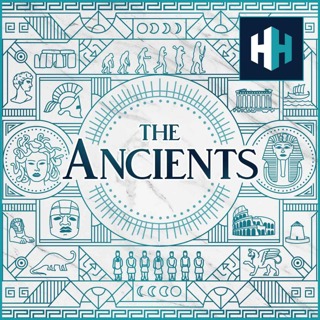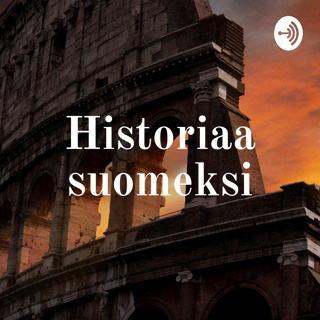
The Phoenician World
Imagine you are a traveller sailing to the major cities around the Mediterranean in 750 BC. You would notice a remarkable similarity in the dress, alphabet, consumer goods, and gods from Gibraltar to Tyre. This was not the Greek world—it was the Phoenician. Based in Tyre, Sidon, Byblos, and other cities along the coast of present-day Lebanon, the Phoenicians spread out across the Mediterranean building posts, towns, and ports. To shine a light on the Phoenician World, with a particular focus on the Phoenician presence in southern Spain, Tristan was joined by Dr Carolina Lopez-Ruiz from the Ohio State University, author of 'Phoenicians and the Making of the Mediterranean.'Phoenicians and the Making of the MediterraneanOrder Tristan’s book today!If you'd like to learn more, we have hundreds of history documentaries, ad free podcasts and audiobooks at History Hit.To download, go to Android or Apple store.If you’re enjoying this podcast and looking for more fascinating The Ancients content then subscribe to our Ancients newsletter! Hosted on Acast. See acast.com/privacy for more information.
3 Helmi 20221h 2min

Alexander's Successors at War: The Spartan Adventurer
It’s here! Today is the publication date of Tristan’s first book, Alexander’s Successors at War: The Perdiccas Years. Focussing in on 323 – 320 BC, the book tells the story of the tumultuous events that seized Alexander the Great’s empire immediately after this titanic figure breathed his last in June 323 BC. Today, we’re giving you a taster of what you can expect.Sit back and relax as Tristan reads out an abridged chapter from the book (including a swift introduction). He tells the story of a Spartan mercenary captain called Thibron, who set forth from Crete with c.6,000 battle hardened mercenaries intend on forging his own Greco-Libyan empire in North Africa. Filled with several twists and turns the story is a symbol for the many fascinating events, and the larger than life cast, that dominate the immediate aftermath of Alexander’s death.Order Tristan’s book today: https://www.amazon.co.uk/Perdiccas-Years-323-Alexanders-Successors/dp/1526775115/ref=zg_bsnr_271237_68/260-7675295-7826601?pd_rd_i=1526775115&psc=1All dates are BC, unless otherwise stated.Map of CyrenaicaMusic provided by All3Media and EpidemicSound.If you'd like to learn more, we have hundreds of history documentaries, ad free podcasts and audiobooks at History Hithttps://access.historyhit.com/?utm_source=audio&utm_medium=podcast&utm_campaign=Podcast+Campaign&utm_id=PodcastTo download, go to Android or Apple store:https://play.google.com/store/apps/details?id=com.historyhit&hl=en_GB&gl=UShttps://apps.apple.com/gb/app/history-hit/id1303668247If you’re enjoying this podcast and looking for more fascinating Ancients content then subscribe to our Ancients newsletter. Follow the link here:https://www.historyhit.com/sign-up-to-history-hit/?utm_source=timelinenewsletter&utm_medium=podcast&utm_campaign=Timeline+Podcast+Campaign Hosted on Acast. See acast.com/privacy for more information.
30 Tammi 20221h

The Scholars of Assyria
Tens of thousands of clay tablets containing texts written in the ancient Cuneiform script of the Assyrian Empire have been discovered, giving us invaluable insights into the inner workings of the Mesopotamian kingdom on the eve of its collapse in the 1st millennium BC.In this fascinating episode, Tristan chats with Professor Eleanor Robson of UCL to help shed light on the incredible history of scholarship in the ancient Near East.Order Tristan’s book today: https://www.amazon.co.uk/Perdiccas-Years-323-Alexanders-Successors/dp/1526775115/ref=zg_bsnr_271237_68/260-7675295-7826601?pd_rd_i=1526775115&psc=1If you'd like to learn more, we have hundreds of history documentaries, ad free podcasts and audiobooks at History Hithttps://access.historyhit.com/?utm_source=audio&utm_medium=podcast&utm_campaign=Podcast+Campaign&utm_id=PodcastTo download, go to Android or Apple store:https://play.google.com/store/apps/details?id=com.historyhit&hl=en_GB&gl=UShttps://apps.apple.com/gb/app/history-hit/id1303668247If you’re enjoying this podcast and looking for more fascinating The Ancients content then subscribe to our Ancients newsletter. Follow the link here:https://www.historyhit.com/sign-up-to-history-hit/?utm_source=timelinenewsletter&utm_medium=podcast&utm_campaign=Timeline+Podcast+CampaignMusic:Over the Dunes - Jon Sumner Hosted on Acast. See acast.com/privacy for more information.
27 Tammi 202244min

Alexander the Great & The Persian Thermopylae (Part Two)
In this second part of Tristan’s explainer, he takes us right into the heart of the battle dubbed the Persian Thermopylae. Listen as Alexander begins a full-blooded assault on the Persian Gates, and find out how this battle for the Persian heartlands ended. Preorder Tristan’s book today: https://www.pen-and-sword.co.uk/The-Perdiccas-Years-323320-BC-Hardback/p/20188 Jona Lendering article: https://www.livius.org/articles/battle/persian-gate-330-bce/ The narrow Yasuj pass. If you'd like to learn more, we have hundreds of history documentaries, ad free podcasts and audiobooks at History Hit. To download, go to Android or Apple store. If you’re enjoying this podcast and looking for more fascinating The Ancients content then subscribe to our Ancients newsletter. Follow this link.Music provided by All3Media and EpidemicSound.Further ReadingHammond, M. (2013), tr., Arrian: Alexander the Great, the Anabasis and the Indica, Oxford.Shepherd, R. (1793), tr., Polyaenus: Stratagems of War, Chicago.Waterfield, R. (2019), tr., Diodorus of Sicily: The Library, Books 16-20, Oxford.Yardley, J. (2001), tr., The History of Alexander: Quintus Curtius Rufus, Chatham.Bosworth, A. B. (1988), Conquest and Empire: The Reign of Alexander the Great, Cambridge.Engels, D. W. (1978), Alexander the Great and the Logistics of the Macedonian Army, London.Heckel, W. (2006), Who's Who in the Age of Alexander the Great, Oxford. Hosted on Acast. See acast.com/privacy for more information.
23 Tammi 202239min

Alexander the Great & The Persian Thermopylae (Part One)
In January 330 BC, Alexander the Great faced one of his most difficult challenges to date. A small Persian force, entrenched in a formidable defensive position that blockaded Alexander’s route to the Persian heartlands. A narrow pass through the Zagros Mountains that has gone down in history as the Persian, or Susian, Gates. Although nowhere near the size or scale of Alexander’s previous pitched battles against the Persians at the Granicus, Issus and Gaugamela, this clash in the mountains deserves its moment in the spotlight. A clash where the tables were turned and the Persians were outnumbered by their Macedonian counterparts. A battle that has been dubbed the Persian Thermopylae. From the immediate aftermath of Alexander’s victory at Gaugamela to his army’s antics at Babylon. From a merciless, punitive campaign in the foothills of the Zagros Mountains to a detailed run down of the Persian stand the Gates, enjoy as Tristan talks you through the events of late 331 / early 330 BC.In this first part, Tristan covers the events that followed Alexander the Great’s victory at Gaugamela and how these culminated with Alexander’s army approaching the Persian heartlands deep in the winter of 331/0 BC.Order Tristan’s book today: https://www.amazon.co.uk/Perdiccas-Years-323-Alexanders-Successors/dp/1526775115/ref=zg_bsnr_271237_68/260-7675295-7826601?pd_rd_i=1526775115&psc=1Jona Lendering article: https://www.livius.org/articles/battle/persian-gate-330-bce/If you'd like to learn more, we have hundreds of history documentaries, ad free podcasts and audiobooks at History Hit. To download, go to Android or Apple store. If you’re enjoying this podcast and looking for more fascinating The Ancients content then subscribe to our Ancients newsletter. Follow this link.Music provided by All3Media and EpidemicSound.Quick notes: We do hear a small detail about what happened to Bagophanes. Alexander assigned him to become one of Mazaeus' adjutants in the new Babylonian administration.Medates is pardoned by Alexander. Whether he retains his position as governor of the lowland Uxians however, is not stated. Hosted on Acast. See acast.com/privacy for more information.
20 Tammi 202238min

The Birth of the Roman Empire
16 January 27 BC is a date sometimes associated with the beginning of the Roman Empire. It was on that day that Octavian received the name Augustus, effectively becoming the first emperor of Rome. Augustus ordered the gates of Janus to be closed, marking an end to the period of Civil War that had characterised Rome for decades before. Entering into a new era of peace, how did Augustus monopolise peace as a concept, and allow Rome to hold onto this new era and way of life across it's Empire? This week Tristan is joined by Dr Hannah Cornwell, author of Pax and the Politics of Peace, to talk about this transitional period, it's reflections in art and monumental architecture, and ultimately, how the Roman Empire came to be.Order Tristan’s book today: https://www.amazon.co.uk/Perdiccas-Years-323-Alexanders-Successors/dp/1526775115/ref=zg_bsnr_271237_68/260-7675295-7826601?pd_rd_i=1526775115&psc=1If you'd like to learn more, we have hundreds of history documentaries, ad free podcasts and audiobooks at History Hithttps://access.historyhit.com/?utm_source=audio&utm_medium=podcast&utm_campaign=Podcast+Campaign&utm_id=PodcastTo download, go to Android or Apple store:https://play.google.com/store/apps/details?id=com.historyhit&hl=en_GB&gl=UShttps://apps.apple.com/gb/app/history-hit/id1303668247If you’re enjoying this podcast and looking for more fascinating The Ancients content then subscribe to our Ancients newsletter. Follow the link here:https://www.historyhit.com/sign-up-to-history-hit/?utm_source=timelinenewsletter&utm_medium=podcast&utm_campaign=Timeline+Podcast+Campaign Hosted on Acast. See acast.com/privacy for more information.
16 Tammi 202250min

The Seleucid Empire: In the Shadow of Rome
At its height, the Seleucid Empire stretched from Thrace (modern day Bulgaria) to the Indus River Valley. Emerging from the tumultuous ‘Successor Wars’ that followed Alexander the Great’s passing, for over a century it was a superpower of the eastern Mediterranean. This, however, ultimately led it into conflict with Rome at the beginning of the 2nd century BC. The result was a devastating defeat for the Seleucid King Antiochus III ‘the Great’ at the Battle of Magnesia, fought around this time of year in either December 190 BC or January 189 BC. Following the battle, the Seleucids were humbled by a damaging treaty, but what happened next? What followed for the Seleucids, having been humbled by the Romans? Did they descend from superpower to suppliant? Or did they experience a resurgence? In today’s podcast, Eduardo Garcia-Molina, a PHD Classics student at the University of Chicago, argues the latter. Focusing in on the reign of Antiochus IV, Eduardo highlights how the Seleucid Empire remained a powerful entity in the wake of Magnesia and their Roman defeat.Order Tristan’s book today: https://www.amazon.co.uk/Perdiccas-Years-323-Alexanders-Successors/dp/1526775115/ref=zg_bsnr_271237_68/260-7675295-7826601?pd_rd_i=1526775115&psc=1If you'd like to learn more, we have hundreds of history documentaries, ad free podcasts and audiobooks at History Hithttps://access.historyhit.com/?utm_source=audio&utm_medium=podcast&utm_campaign=Podcast+Campaign&utm_id=PodcastTo download, go to Android or Apple store:https://play.google.com/store/apps/details?id=com.historyhit&hl=en_GB&gl=UShttps://apps.apple.com/gb/app/history-hit/id1303668247If you’re enjoying this podcast and looking for more fascinating The Ancients content then subscribe to our Ancients newsletter. Follow the link here:https://www.historyhit.com/sign-up-to-history-hit/?utm_source=timelinenewsletter&utm_medium=podcast&utm_campaign=Timeline+Podcast+Campaign Hosted on Acast. See acast.com/privacy for more information.
13 Tammi 20221h 3min

Spinning in the Roman World
Spinning held an important place in ancient society, and no, we're not talking about ancient exercise classes. A task for women and slaves, it was used to create clothes, ships sails, and ropes, and its products were integral to all parts of society. An unchanging art for centuries and seen across the globe, spinning was an important practice in the ancient world. This week Tristan is joined by Carey Fleiner to discuss spinning's role in myths, the textiles it helped produce, and its importance in antiquity.Warning: one case of mild language.Order Tristan’s book today: https://www.amazon.co.uk/Perdiccas-Years-323-Alexanders-Successors/dp/1526775115/ref=zg_bsnr_271237_68/260-7675295-7826601?pd_rd_i=1526775115&psc=1If you'd like to learn more, we have hundreds of history documentaries, ad free podcasts and audiobooks at History Hithttps://access.historyhit.com/?utm_source=audio&utm_medium=podcast&utm_campaign=Podcast+Campaign&utm_id=Podcast To download, go to Android or Apple store:https://play.google.com/store/apps/details?id=com.historyhit&hl=en_GB&gl=UShttps://apps.apple.com/gb/app/history-hit/id1303668247If you’re enjoying this podcast and looking for more fascinating Ancients content then subscribe to our Ancients newsletter. Follow the link here:https://www.historyhit.com/sign-up-to-history-hit/?utm_source=timelinenewsletter&utm_medium=podcast&utm_campaign=Timeline+Podcast+Campaign Hosted on Acast. See acast.com/privacy for more information.
9 Tammi 20221h 7min






















